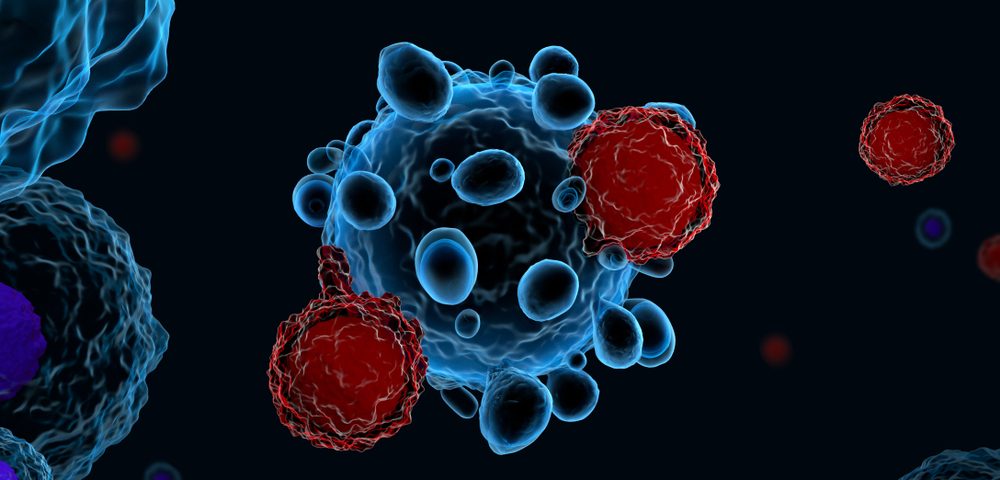Kymriah (tisagenlecleucel), a chimeric antigen receptor (CAR) T-cell therapy developed by Novartis, is able to ellicit prolonged complete responses with minor side effects in adults with relapsed or refractory diffuse large B-cell lymphoma (DLBCL), according to new data from a Phase 2 trial.
The results from JULIET (NCT02445248) were in an oral presentation, “An updated analysis of JULIET, a global pivotal Phase 2 trial of tisagenlecleucel in adult patients with relapsed or refractory (r/r) diffuse large b-cell lymphoma (DLBCL),” given at the 23rdAnnual Congress of the European Hematology Association (EHA) on June 16 in Stockholm.
Kymriah was the first cell-based gene therapy to be approved by the U.S. Food and Drug Administration (FDA) to treat relapsing or refractory acute lymphoblastic leukemia (ALL) or non-Hodgkin’s lymphoma (NHL) in pediatric and young adult patients up to 25 years old.
ALL is the most frequent type of leukemia in children, and is marked by the bone marrow producing too many white blood cells, or lymphocytes, that fail to develop correctly. This excess of abnormal lymphocytes can cause swelling and damage to internal organs, and prevents the body from producing other blood cells, resulting in anemia and a dampened immune response.
In a similar way, DLBCL — the most common form of NHL — is an aggressive cancer of the lymphatic system caused by accumulation of abnormal B-cells.
Kymriah, a form of gene therapy, uses a patient’s own T-cells to attack and destroy tumor cells expressing CD19 — a protein often found in cancerous lymphocytes. First, physicians collect the patient’s immune cells and genetically engineer them to aggressively target tumor cells. Once the procedure is complete, the final stage is to inject the modified T-cells back into the patient.
The multi-center global, open-label Phase 2 trial is evaluating the long-term safety and efficacy of Kymriah in relapsed or refractory advanced DLBCL patients (median age, 56). It is scheduled to conclude in 2023.
The FDA approved Kymriah to treat adults with relapsed or refractory large B-cell lymphoma in May based on data from the JULIET study.
Of patients enrolled in the trial at the cutoff date for this data, 111 were infused with a single dose of Kymriah containing a median of 300 million genetically modified cells. Fifty had left the study before infusion due to rapid disease progression, and 12 could not be infused due to an inadequate number of CAR-T cells.
Among infused patients, 93 were followed for at least three months and 81 patients for over a year to assess efficacy.
Their overall response rate was 52 percent, with 40 percent achieving a complete response and 12 percent a partial response. Among those who achieved a complete response at three months post-treatment, 83 percent remained in remission after a year.
Analysis found that 65 percent of patients remained relapse-free one year after their first response. Remarkably, 54 percent of patients who achieved a partial response evolved to a complete response. The median overall survival among all infused patients was 11.7 months, with 49 percent of the patients achieving an overall survival of 12 months.
The median time from infusion to data cutoff was 14 months, with a maximum time interval of 23 months. At the time of data cutoff, no patients responsing to Kymriah proceeded to stem cell transplantation.
These promising study results were in agreement with those previously reported during an interim analysis of the JULIET trial, where 37 percent percent of patients with relapsed or refractory DLBCL saw their cancer disappear (a complete response) after receiving Kymriah.
“When we continued follow-up with DLBCL patients in the global JULIET study, we were extremely pleased that response rates were maintained a year or more after infusion with Kymriah, which was consistent with the durable responses seen in the pilot studies conducted at Penn,” Stephen Schuster, MD, said in a press release. (Schuster is the Robert and Margarita Louis-Dreyfus Professor in Chronic Lymphocytic Leukemia and Lymphoma Clinical Care and Research at the University of Pennsylvania’s Perelman School of Medicine, and director of the Lymphoma Program at the Abramson Cancer Center.)
Within eight weeks of infusion with Kymriah, cytokine release syndrome (CRS) — a known complication of CAR T-cell therapy that occurs in patients with an overactive immune system — occurred in 22 percent of the patients.
Other reported side effects included neurologic adverse effects, cytopenias (low blood cell levels) lasting more than 28 days, infections, and febrile neutropenia. All deaths occurring throughout the study were attributed to disease progression.
The European Medicines Agency (EMA) is currently evaluating Kymriah for the treatment of children and young adults with ALL and adult patients with DLBCL.


